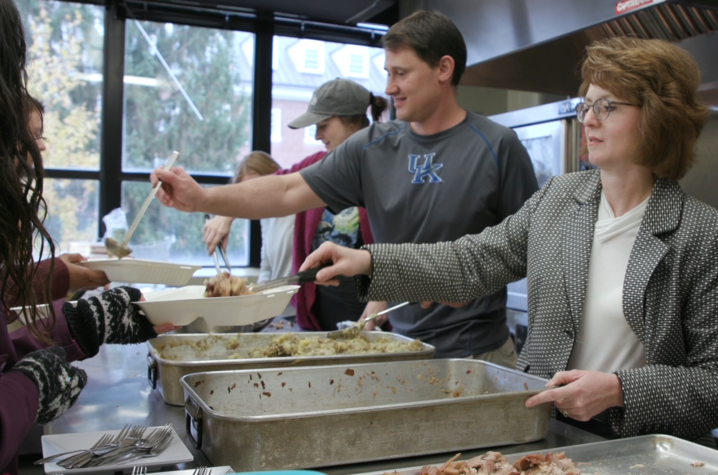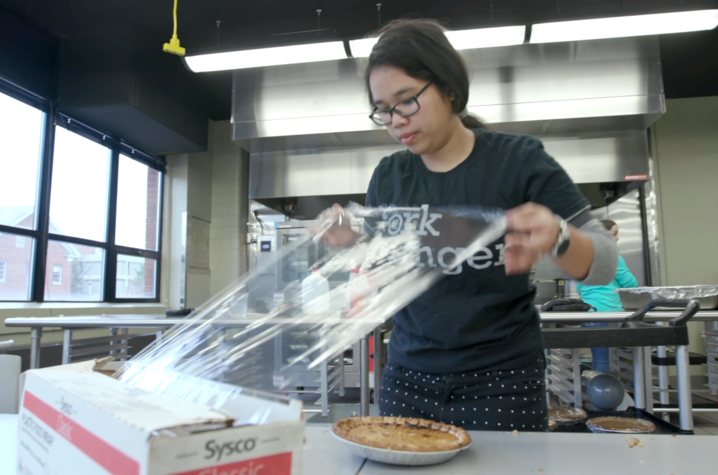UK Students Cook Farm-to-Fork Food for Fellow Wildcats
LEXINGTON, Ky. (Jan. 10, 2019) — Once a week during the semester, students line up in the hallways of Funkhouser anxiously awaiting lunch, which is cooked by fellow students as part of the Farm-to-Fork program.
“Farm-to-Fork is a grant-funded meal program that provides not only free locally sourced lunches using recovered foods and produce, but also education and a sense of community to any UK students,” said Kendra Oo, a UK graduate student studying nutrition and food systems in UK’s College of Agriculture, Food and Environment. “To offer a multidimensional, interdisciplinary approach to college food insecurity, Farm-to-Fork integrates social, sustainable, local and educational elements through healthy lunchtime meals served to approximately 100 students weekly.”
Every Wednesday between 11 a.m.-1 p.m., students are welcomed to eat in Room 207 of the Funkhouser Building. The first day of Farm-to-Fork for the 2019 spring semester is Wednesday, Jan. 23, and lunch will be held every Wednesday until the week leading up to finals week, with the exception of Spring Break.
This effort is led by UK’s Campus Kitchen. The goal is to bring awareness to issues surrounding hunger, albeit in a different way. The focus of the kitchen is on helping people on and off campus in the greater Lexington community while also trying to keep food from going to waste.
We recently had a chat with Kendra Oo, RDN, one of the founding members of Campus Kitchen, about the Farm-to-Fork program.
UKNow: How did you get involved in Campus Kitchen?
Oo: During my first year here at UK as a dietetics student, I heard that the Department of Dietetics and Human Nutrition was planning to establish the Campus Kitchen at the University of Kentucky (CKUK), an affiliate of the national Campus Kitchens Project. As I have a strong passion for issues like food insecurity and food waste, I took on a leadership role as one of the co-founders of CKUK in 2014. After its establishment, I served as the development chair for two years, writing grant applications to sustain and expand its operations as well as leading events.
UKNow: What do you hope fellow students take away from the Farm-to-Fork experience?
Oo: I hope my fellow students learn that eating healthy, while on a budget and with time constraints, is possible and Farm-to-Fork is here to provide resources and support. I also want students to dissociate food insecurity from poverty and hunger, as it is not always the case. Farm-to-Fork is striving to address varying levels of food insecurity on college campus by providing a welcoming, friendly space to socialize and share a meal together.
UKNow: What is the most fulfilling aspect of leading this effort?
Oo: Leading Farm-to-Fork has been a joy in my life as it is such a self-fulfilling and rewarding task. I socialized, shared a meal, and made an acquaintance with students from other majors while observing interdisciplinary students enjoying their time at Farm-to-Fork.
Because I am in charge of training and mentoring our undergraduate coordinators, I witnessed their personal and professional growth, which is another rewarding aspect of this effort. I have also seen growth in our volunteers in terms of their cooking and interpersonal skills. There were days I could not stop smiling out of joy when I thought of my amazing team, support for Farm-to-Fork, and the impacts on students that we have made thus far.
UKNow: What are you studying and what makes your academic program unique?
Oo: I am a registered dietitian and currently, I am pursuing a master's degree in nutrition and food systems. The DHN Graduate Program provides several opportunities for the majority of graduate students to gain hands-on experiences and to challenge themselves for their own growth while allowing them to work closely with professors and learn more from them.
UKNow: What made you choose UK for graduate school?
Oo: The Department of Dietetics and Human Nutrition (DHN) is what I love most about UK, which is why I chose UK for my graduate studies. The department has been my second home since I left Burma about five years ago. It has helped me grow professionally and personally, as well as develop personal relationships with our faculty and staff. The department has taught me that an inclusive, friendly, and supportive learning environment for all students, staff and faculty is possible even in a large research institution like UK by putting a little more effort and care into what we do.
UKNow: How important is it to you to learn both in the classroom and outside of the classroom during grad school?
Oo: I cannot stress enough on how important it is for students to apply what we have learned from class in real life. This is a great way to ensure all the valuable information we have learned is ingrained in our memory and understand the concepts in a deeper level than what textbooks and traditional lectures provide. Leading Farm-to-Fork has enhanced my learning at UK as I am dealing with real-life situations that requires a lot of multitasking and quickly applying what I have learned into making important decisions for its weekly operations. On top of that, this has improved soft skills that we typically do not learn in classes.
UKNow: What’s your favorite aspect of life as a UK graduate student?
Oo: My favorite aspect is being able to gain hands-on experiences in various areas such as leading Farm-to-Fork, on top of my graduate thesis research and 20-hour graduate teaching assistantship. I also enjoy learning more and more about "behind-the-scenes" work and efforts that go into developing and managing undergraduate courses as I have never learned about it in my coursework.
UKNow: Where do you see yourself in 10 years?
Oo: Because of my strong passion for community nutrition, I want to continue working in this field, helping the community and advocating for community nutrition issues such as food insecurity. From my undergraduate and graduate experience at UK, teaching nutrition and conducting nutrition-related research has become my inspiration and a long-term career goal so I would like to pursue a Ph.D. in public health or nutrition after gaining work experience.
UKNow: What advice do you have for UK students?
Oo: I think it is really important for students to seek opportunities continuously as there are great resources and opportunities at UK. It is a matter of deliberately seeking and pursuing one opportunity after another to gain experiences and make yourself a well-rounded individual by the time you graduate. In addition to coursework, it is important to learn how to multitask and manage your time well from your seniors, peers and/or mentors so that you can gain experiences from other extracurricular activities that enhance your learning. Also, please make use of your professors' office hours to show initiative, drive and willingness to learn as well as to get to know them more.
Watch the video above to meet other students involved in the Farm-to-Fork program and discover why the initiative has opened up their eyes to issues of hunger and sustainability.
For more information, visit the UK Campus Kitchen Facebook page.






